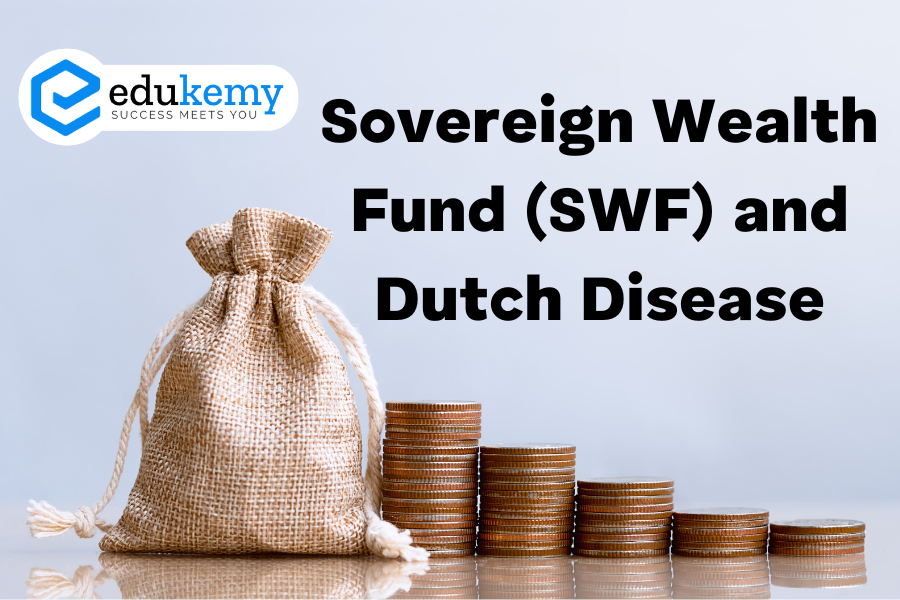
A Sovereign Wealth Fund (SWF) is a state-owned investment fund comprising financial assets, such as stocks, bonds, real estate, and other investment vehicles. Established by countries with substantial financial surpluses, typically derived from revenues generated by exports of commodities like oil or natural gas, SWFs serve various purposes, including macroeconomic stabilization, intergenerational wealth transfer, and strategic investment. However, the phenomenon of Dutch Disease, named after the experience of the Netherlands in the 1960s, poses a significant challenge to economies heavily reliant on natural resource exports. Dutch Disease refers to the negative economic consequences that can arise when a country experiences a sudden influx of revenue from commodity exports, leading to currency appreciation, decreased competitiveness in non-resource sectors, and potential economic imbalances. Understanding and managing the interplay between SWFs and Dutch Disease is crucial for resource-rich nations seeking sustainable economic development and diversification.
Contents
1. Sovereign Wealth Fund (SWF):
- Definition: A Sovereign Wealth Fund (SWF) is a fund composed of foreign currency reserves, typically managed by the central bank or a special government entity (special purpose vehicle). The primary purpose of an SWF is to invest these reserves in global assets to generate higher returns compared to traditional investments in foreign government bonds.
- Composition: SWFs are established by countries that accumulate significant foreign currency assets through sources like exports or foreign investors, including multinational corporations (MNCs). The fund’s investments may include shares, bonds, real estate, and strategic assets like energy fields or agricultural holdings. SWFs may also be used for acquiring ownership stakes in foreign companies.
- Objective: The main objective of SWFs is to maximize returns on foreign currency reserves, offering an alternative to low-yield investments in government bonds. Notably, India has not established an SWF due to its reserves being insufficient for the country’s needs and the nature of its forex reserves, which are considered “borrowed resources” rather than earned through significant exports or foreign direct investment (FDI).
2. Dutch Disease:
- Origin: The term “Dutch Disease” originated from the experience of the Netherlands in the 1960s when the country discovered substantial reserves of oil and related fuels, leading to a surge in exports.
- Impact: As the Netherlands exported large amounts of oil, the influx of foreign exchange caused the Dutch Guilder to appreciate significantly. This appreciation had adverse effects on the economy:
- Exports from other sectors suffered due to the strong currency.
- Imports increased substantially.
- The competitiveness of Dutch industries declined, leading to deindustrialization.
- Definition: Dutch Disease refers to the economic phenomenon where the discovery and export of a particular commodity (such as oil or natural resources) lead to the appreciation of the national currency. This, in turn, negatively affects other sectors of the economy, resulting in a decline in overall economic performance.
Conclusion: Understanding the concept of Sovereign Wealth Fund (SWF) provides insights into how countries manage and invest their foreign currency reserves. The phenomenon of Dutch Disease highlights the challenges associated with the overreliance on a single commodity for economic growth, especially when it leads to currency appreciation and adverse impacts on other industries. Both concepts reflect the complexities of managing a country’s economic resources in a global context.
FAQs
1. What is a Sovereign Wealth Fund (SWF)?
- A Sovereign Wealth Fund (SWF) is a state-owned investment fund that is composed of financial assets such as stocks, bonds, real estate, or other financial instruments. These funds are typically created by countries with large surpluses from trade or fiscal budgets.
2. What is the purpose of a Sovereign Wealth Fund?
- The primary purpose of a Sovereign Wealth Fund is to manage and invest surplus funds for the benefit of future generations, stabilizing the economy, and mitigating risks associated with fluctuating commodity prices or other economic factors.
3. How are Sovereign Wealth Funds funded?
- Sovereign Wealth Funds are funded through various means, including revenues from exports of natural resources, such as oil, gas, or minerals, fiscal surpluses, foreign exchange reserves, or proceeds from privatization of state-owned assets.
4. What is Dutch Disease?
- Dutch Disease refers to the negative impact on an economy resulting from a sharp increase in revenues from natural resources, such as oil or natural gas. This phenomenon often leads to currency appreciation, which in turn makes other sectors, particularly manufacturing and agriculture, less competitive on the global market.
5. How does Dutch Disease affect an economy?
- Dutch Disease can lead to a decline in the competitiveness of non-resource sectors, as they struggle to compete with the booming resource sector for resources, labor, and investment. Additionally, it can result in a loss of export competitiveness, trade imbalances, and volatility in government revenues.
6. What are the symptoms of Dutch Disease?
- Symptoms of Dutch Disease include currency appreciation, increased imports of goods and services, decline in manufacturing and agricultural sectors, loss of competitiveness in non-resource industries, and overreliance on volatile revenues from natural resources.
In case you still have your doubts, contact us on 9811333901.
For UPSC Prelims Resources, Click here
For Daily Updates and Study Material:
Join our Telegram Channel – Edukemy for IAS
- 1. Learn through Videos – here
- 2. Be Exam Ready by Practicing Daily MCQs – here
- 3. Daily Newsletter – Get all your Current Affairs Covered – here
- 4. Mains Answer Writing Practice – here

